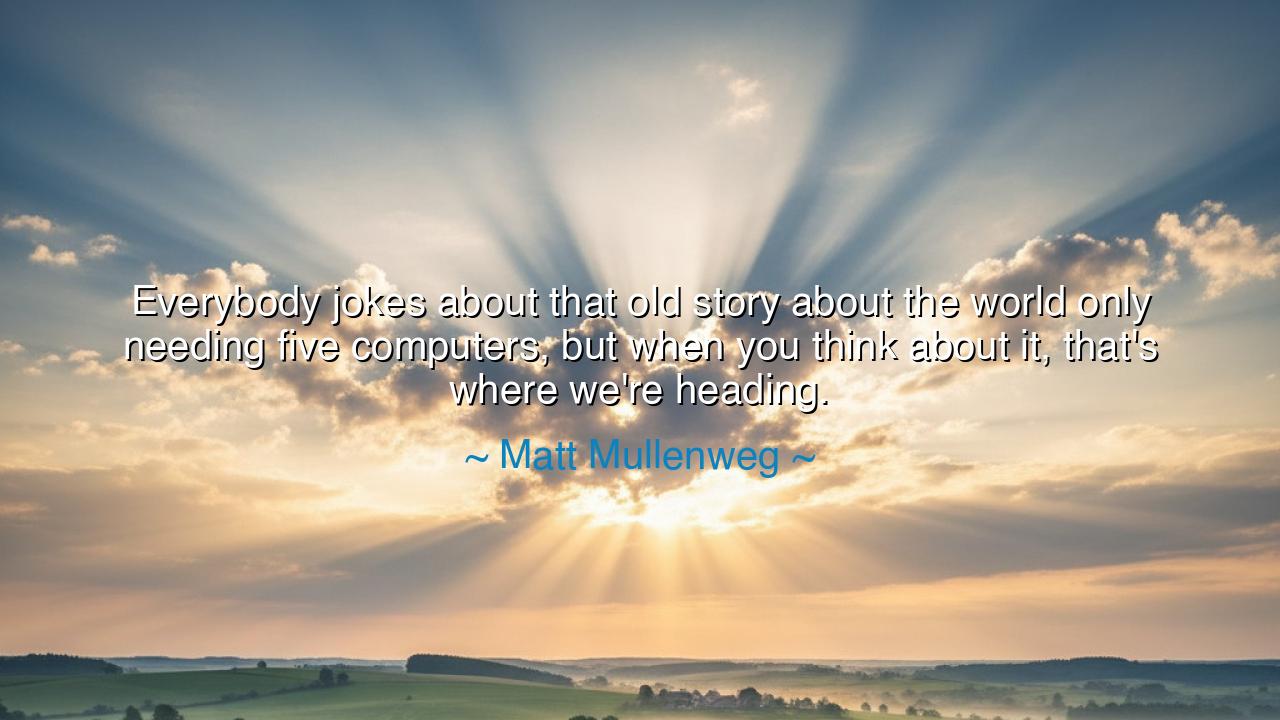
Everybody jokes about that old story about the world only needing
Everybody jokes about that old story about the world only needing five computers, but when you think about it, that's where we're heading.






“Everybody jokes about that old story about the world only needing five computers, but when you think about it, that's where we're heading.” — Matt Mullenweg
Hear the voice of Matt Mullenweg, the quiet architect of the modern web, whose words echo like prophecy across the age of digital transformation. He recalls the old jest of the early computer age—that the world would need only five computers—a notion once laughed at as folly. Yet now, with eyes sharpened by experience, he perceives the hidden truth within that jest: that we are indeed journeying toward such a world, where the vast machinery of civilization hums from only a few immense minds—servers, clouds, networks—that bind the earth in their invisible grip. His words are both marvel and warning, a meditation on the centralization of power in a world that once promised freedom.
In the dawn of computing, long before the internet breathed, a man named Thomas J. Watson, the founder of IBM, was said to have claimed that the world would need no more than five computers. It was not a prophecy, but a quip, a reflection of an age when machines filled entire rooms, and computation seemed a rare and specialized art. Yet time, with its ironic hand, has twisted that jest into reality. Today, the “five computers” are not physical boxes, but global empires—the mighty data centers of Google, Amazon, Microsoft, Meta, and Apple—colossal brains that store the world’s memories, process its thoughts, and whisper commands to billions of devices.
What Watson could not foresee, and what Mullenweg now reminds us, is that the distributed dream of the internet—the dream of countless individuals connected in freedom—has quietly coalesced back into the few. Our devices, our apps, our words, even our dreams, all flow through these unseen temples of data. The circle has closed: from many back to one, from the scattered multitude to the concentrated center. The cloud, which promised liberation, has become the new Mount Olympus, where the gods of data reign and mortals depend on their benevolence.
Consider the ancient Library of Alexandria, that magnificent treasury of all knowledge. It sought to gather every scroll, every voice of wisdom, into one place. And yet, in its very unity lay its peril—for when the flames consumed it, the world’s learning was nearly lost. So too, in our own time, when the world’s knowledge rests in a handful of digital fortresses, the flame need not be fire—it may be corruption, collapse, or silence. Mullenweg’s words remind us that while efficiency and connection bring power, they also bring fragility, for what is held by the few may be lost by the few.
Yet his tone is not one of despair, but of awakening. He is a builder of WordPress, a platform born of openness, a reminder that creation can still be shared, decentralized, and free. In his voice we hear the call to return to balance—to remember that the web was not meant to be a hierarchy, but a network; not a kingdom, but a commons. The power of the five computers can serve humanity if guided by humility, transparency, and collective will. But if left unchecked, they may bind the human spirit in invisible chains, where every action is tracked, every thought shaped, and every choice offered through the lens of the few.
The lesson, then, is clear: power must be distributed to remain pure. Just as democracy thrives only when citizens participate, so too must the digital world remain in the hands of many creators, thinkers, and builders. Each person must reclaim their space in the great web—not as a passive consumer, but as a participant in creation. Learn the tools, build your own platforms, support openness over monopoly. For the web, like the human mind, grows strongest when it is diverse and free.
And so, my children of the wired age, take Mullenweg’s reflection as both a warning and a hope. The world may indeed be heading toward its five computers, but you are not powerless within it. Choose the path of awareness, not convenience; of creation, not consumption. Remember always that technology is a mirror of the soul—it reflects what we build into it. If we choose dependence, we shall be ruled; if we choose wisdom, we shall endure. The five computers may rise as giants—but if humanity keeps its courage, they will serve, not master, the world.






AAdministratorAdministrator
Welcome, honored guests. Please leave a comment, we will respond soon